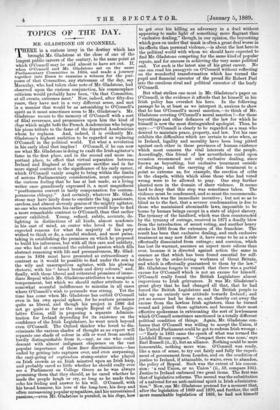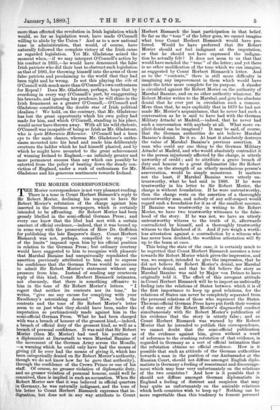TOPICS OF THE DAY.
MR. GLADSTONE ON O'CONNELL.
THERE is a curious irony in the destiny which has brought Mr. Gladstone at the close of one of the longest public careers of the century, to the same point at which O'Connell may be said almost to have set out. If, when O'Connell and Mr. Gladstone sat on the same Parliamentary Committee in 1834, and made a journey together into Essex to examine a witness for the pur- poses of that Committee, any statesman of the day, say Macaulay, who had taken close note of Mr. Gladstone, had observed upon the curious conjunction, his commonplace criticism would probably have been, 'On that Committee, at all events, extremes meet.' Now, indeed, after fifty-five years, they have met in a very different sense, and met in a manner that would be as astonishing to O'Connell's spirit as it must sometimes seem to Mr. Gladstone's. Mr. Gladstone recurs to the memory of O'Connell with a sort of filial reverence, and pronounces upon him the kind of eloge which might befit the French Academician who brings his pious tribute to the fame of the departed Academician whom he replaces. And, indeed, it is evidently Mr. Gladstone's highest ambition to be regarded as replacing O'Connell in the political world. Yet what a revolution in his early ideal that implies ! O'Connell, if he can now see what Mr. Gladstone is doing to exalt the Irish agitator's fame in the first place, and in the second and more im- portant place, to effect that virtual separation between Ireland and England at far greater sacrifice and. in far more signal contrast to the significance of his early career, which O'Connell vainly sought to bring within the limits of serious Parliamentary consideration, must experience the curious feeling that he has at last made, as a living writer once grandiosely expressed it, a most magnificent "posthumous convert in tardy compensation for contem- poraneous obloquy." And certainly, whatever Mr. Glad- stone may have lately done to emulate the big, passionate, careless, and almost slovenly genius of the mighty agitator, no one who remembers his earlier career could hope to find a more remarkable contrast to O'Connell, than that earlier career exhibited. Young, refined, subtle, accurate, de- lighting in distinctions of all kinds, almost academic in his cast of mind, an orator who loved to find un- expected reasons for what the majority of his party wished to think or do, a careful student, and most pains- taking in establishing the premisses on which he proposed to build his inferences, but with all this care and subtlety, one who had at command the subdued passion which fills abstract reasoning with life and persuasiveness, Mr. Glad- stone in 1834 must have presented as extraordinary a contrast as it would be possible to find under the sun to the wily and unscrupulous agitator, with his glowing rhetoric, with his" broad brush and dirty colours," and, finally, with those liberal and reiterated promises of imme- diate Repeal which Mr. Gladstone attributes to a sanguine temperament, but which we should rather attribute to a somewhat scornful indifference to minutiae in all cases where O'Connell's wish to persuade was strong. Yet the time has come when Mr. Gladstone has outbid O'Connell even in his own special sphere, for he scatters promises quite as liberal, and though his project in 1886 did not go quite so far as the simple Repeal of the Legis- lative -Union, still in proposing a separate Adminis- tration for Ireland depending for its existence on the confidence of the Irish legislature, he went much beyond even O'Connell. The Oxford thinker who loved to dis- criminate the various shades of thought as an expert will separate one shade of colour in silk or wool from another hardly distinguishable from it,—nay, as one who could descant with almost .indignant eloquence on the vast popular importance of these finer discriminations,—has ended by getting into raptures over, and even surpassing, the easy-going ad captandura stump-orator who played on Irish crowds as an Irish minstrel upon an Irish harp, and probably cared as little whether he should really ever see a Parliament on College Green as he was always promising them that they should, as he cared whether he made the people laugh or cry, so long as he made them echo his feeling and answer to his will. O'Connell, with his broad humour, his love of the long-bow, his deep and often unreasoning popular sympathies, and his unrestrained passions,—even Mr. Gladstone is puzzled, in his &le, how to get over his killing an adversary in a duel without appearing to make light of something more flagrant than "exclusive dealing," though, in our opinion, the boycotting which goes on under that mask is often a great deal worse in its effects than personal violence,—is about the last hero in the political world with whom we should have expected to find Mr. Gladstone competing for the same kind of popular repute, and for success m achieving the very same political end. Yet such is the latest aim of his great career. No one can read his panegyric on O'Connell without reflecting on the wonderful transformation which has turned the pupil and financial executor of the proud Sir Robert Peel into the emulous rival and political executor of the burly O'Connell.
But what strikes one most in Mr. Gladstone's paper on O'Connell, is the evidence it affords that he himself in his Irish policy has overshot his hero. In the following passage he is, at least as we interpret it, anxious to show that he has O'Connell's moral sanction,—to think of Mr. Gladstone coveting O'Connell's moral sanction !—for those boycottings and other defiances of the law for which he himself is now the most distinguished apologist. Thus, he says :—" O'Connell is clearly to be regarded as a man who desired to maintain peace, property, and law. Yet his case exhibits the difficulties which are certain to arise when, as in Ireland, legality and morality have been long pitted against each other in those provinces of human existence which most concern the vital interests of the people. Accordingly, this friend of law nevertheless could upon occasion recommend not only exclusive dealing, since known as boycotting, but exclusive treatment outside of dealings ; and the carrying of this treatment to a point so extreme as, for example, the erection of cribs in the chapels, within which alone those who had voted wrong were to be allowed to pray. One step further planted men in the domain of sheer violence. It seems- hard to deny that this step was sometimes "taken. The violence must be condemned, and so must the recommenda- tion which was the immediate incentive ; but not so as to blind us to the fact, that a severer condemnation is due to those who maintained abominable laws, impossible to be borne by human beings except in a state of abject slavery. The tyranny of the landlord, which was then counteracted by the tyranny of outrage, received in 1871 a deadly blow from the introduction of secret voting, and another heavy stroke in 1885 from the extension of the franchise. The result has been that exclusive dealing, and such exclusive treatment as may now follow it, have come to be as a rule effectually dissociated from outrage ; and coercion, which has lost its warrant, assumes an aspect more odious than ever, because it is directed against action the same in essence as that which has been found essential for self- defence by the order-loving workmen of Great Britain, and which is effectually guaranteed to them by the law." Mr. Gladstone forgets to remark that there was a. partial excuse for O'Connell which is not an excuse for himself. O'Connell really found the British Legislature almost impervious to Irish grievances. It was Mr. Gladstone's great glory that he had changed all that, that he had forced the British Legislature and the British people to take up an entirely new attitude towards Ireland ; and yet no sooner had he done so, and thereby cut away the excuse from the lawless Irish agitators, than he turned " round and joined those agitators, and became their most effective spokesman in extenuating the sort of lawlessness which O'Connell sometimes sanctioned in a totally different political condition of things. Again, Mr. Gladstone con- fesses that O'Connell was willing to accept the Union, if the United Parliament could be got to redress Irish wrongs : —" Early in 1835 came the epoch of what was termed the Lichfield House compact. Compact there was none,' says Earl Russell 2), but an alliance Nothing could be more honourable, nothing more wise. O'Connell was ready, like a man of sense, to try out fairly and fully the experi- ment of government from London, and on the condition of justice to Ireland, if attainable, to waive, even to abandon, the policy of Repeal. Such was the extent of his conces- sion: a real Union, or no Union' (ii., 59, compare 105). Justice to Ireland embraced two great items. The first was that of legislative reforms. The second was the substitution of a national for an anti-national spirit in Irish administra- tion." Now, can Mr. Gladstone pretend for a moment that, after the legislation of 1869 and 1870, and further, the still more remarkable legislation of 1881, he had not himself more than effected the revolution in Irish legislation which would, so far as legislation went, have made O'Connell willing to abide by the Union ? And as to a new national tone in administration, that would, of course, have naturally followed the complete victory of the Irish cause as regarded legislation. Yet Mr. Gladstone seized the moment when,—if we may interpret O'Connell's action by his conduct in 1835,—he would have denounced the false Irish patriots who did their best to obstruct such legislation as that of 1881, for throwing himself into the arms of those false patriots and proclaiming to the world that they had been right and he wrong. Is not this playing the role of O'Connell with much more than O'Connell's own enthusiasm for Repeal ? Does Mr. Gladstone, perhaps, hope that by overdoing in every way O'Connell's part, by exaggerating his bravado, and ignoring his prudence, he will shine in the Irish firmament as a greater O'Connell,—O'Connell and Gladstone constituting the double star of Irish political idealism ? We hold, on the contrary, that Mr. Gladstone has lost the great opportunity which his own policy had made for him, and which O'Connell, standing in his place, would never have thrown away. With all his wild rhetoric, O'Connell was incapable of being so Irish as Mr. Gladstone, who is ipsis HThernicis Hibernior. O'Connell had a keen eye to the main chance, whereat; Mr. Gla,dstone's enthu- siasm mounted into his head and made him deliberately overturn the ladder which he had himself planted, and by which he might have mounted to the great achievement of winning Ireland to England,—an infinitely greater and more permanent success than any which can possibly be extorted from the policy of beating down the steady con- viction of England, under a rush of enthusiasm for Mr. Gladstone and his generous sentiments towards Ireland.















































 Previous page
Previous page